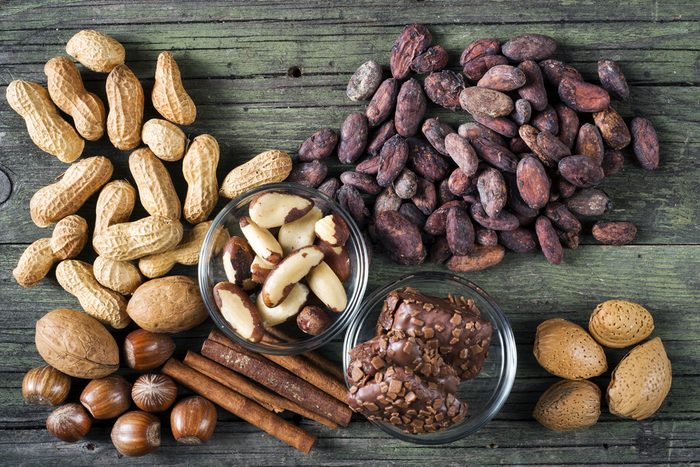
Fill up on fewer calories
Start your meals with veggie-packed salads or soups, or use small plates to trick your brain into thinking your meals look bigger than they actually are. Filling up on fewer calories allows you to shed pounds, which can help reverse other risks for Alzheimer’s disease, including sleep apnea, high blood pressure, and diabetes. Cutting your daily intake of calories by 30 to 50 percent also reduces your metabolic rate and therefore slows oxidation throughout the body, including the brain. It lowers blood glucose and insulin levels, too.

Eat at least five servings of fruit and vegetables every day
Higher vegetable consumption was associated with slower rate of cognitive decline in 3,718 people aged 65 years and older who participated in the Chicago Health and Aging Project. Study participants filled out food logs and agreed to undergo tests of their cognitive abilities periodically for six years. All of the study participants scored lower on cognitive tests at the end of the study than they did at the beginning, but those who consumed more than four daily servings of vegetables experienced a 40 percent slower decline in their abilities than people who consumed less than one daily serving. Make sure you can recognize the 10 early signs of Alzheimer’s every adult should know.

Use spices liberally
Herbs and spices add flavor to food, allowing you to cut back on butter, oil, and salt. Because they come from plants, many herbs and spices also contain antioxidants and offer many healing benefits, including Alzheimer’s prevention. Several different studies show that curcumin, for example, helps to reduce the risk of cancer, arthritis, depression, and Alzheimer’s disease. Just a quarter teaspoon of the spice twice a day has been shown to reduce fasting blood sugar up to 29 percent in people with type 2 diabetes. This is important because type 2 diabetes can raise your risk of developing Alzheimer’s disease.

Marinate meat before cooking
When fat, protein, and sugar react with heat, certain harmful compounds form called advanced glycation end products (AGEs). They are found in particularly high levels in bacon, sausages, processed meats, and fried and grilled foods. The consumption of high amounts of AGEs has been shown to cause harmful changes in the brain. But there’s an easy way to slash your AGE consumption: Make your food (especially meats) as moist as possible. By boiling, braising, poaching, or marinating meat and fish before grilling or broiling, you allow moisture to permeate their flesh, dramatically reducing the AGEs.

Eat coldwater fish once a week
Fish that swim in cold waters tend to develop a layer of fat to keep them warm. Called omega-3 fatty acid, this type of fat has been shown to reduce inflammation throughout the body when consumed by humans. In a study of 815 people, people who consumed fish at least once a week reduced their Alzheimer’s disease risk by 60 percent compared to people who rarely or never ate fish.

Snack on nuts and seeds
In addition to being a rich source of omega-3 fatty acids, nuts and seeds also provide a good dose of selenium and vitamin E, two other nutrients that may promote brain health. Walnuts may be a particularly potent source of edible brain protection. In addition to omega-3 fatty acids, walnuts are rich in antioxidants that have been shown to reduce Alzheimer’s disease in mice. Steer clear of these 9 habits that can seriously up your dementia risk.

Drink several cups of tea a day
Black and green tea are rich sources of antioxidants called catechins that may fend off oxidative damage throughout the body, including the brain. Green tea is also a rich source of epigallocatechin-3-gallate (EGCG), which has been shown to reduce beta-amyloid plaque and tau tangles in mice. Tea has also been shown to drop blood pressure and cholesterol levels.

Enjoy coffee in the morning
Caffeine consumed too late in the day may disturb your sleep. But coffee consumed in the morning and perhaps the early afternoon, depending on your personal caffeine sensitivity, may reduce risk. Coffee contains a chemical called eicosanoyl-5-hydroxytryptamide (EHT) that, in studies done on rats, has been shown to protect against Alzheimer’s disease. The caffeine itself may also be protective: Mice developed fewer tau tangles in their brains when their drinking water was infused with caffeine. In humans, Johns Hopkins researchers have shown that 200 milligrams of caffeine—the amount in one strong cup of coffee—can help us consolidate memories and more easily memorize new information. Don’t miss these 15 other things neurologists do to prevent Alzheimer’s.

End dinner with dark chocolate—not chocolate cake
Most desserts are rich in blood-sugar-spiking sugar, and recent research has linked high blood sugar levels with oxidative damage as well as an elevated production of beta-amyloid protein plaque. Chocolate, however, may be one exception. Chocolate contains antioxidant chemicals called flavonoids, protective substances also present in many brightly colored fruits and vegetables. Baby boomers who consumed chocolate-rich drinks twice a day for three months performed as well on memory tests as did people a few decades younger. In part of the same study, tests revealed that the chocolate drinks also seemed to improve blood flow to the hippocampi regions of the brain. Here are even more everyday habits that can reduce your risk of Alzheimer’s.